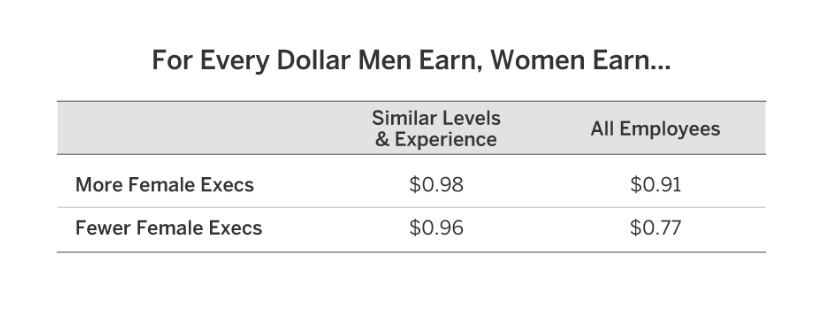Why Having More Female Executives Can Make Or Break Your Company

We already know companies with more female executives are more profitable. Now, a new study revealed that employees within these companies are reaping benefits as well.
Released by RedFin, the study examined 31 of the largest U.S. tech companies, comparing employee satisfaction in those with higher or lower female representation on the board of executives. It found that, on average, employees were more satisfied with their job in companies with more female executives. Also, less employees in these companies were considering leaving within six months.
The gender wage gap in companies with more female executives was half the size of that in companies with less female executives. This gap was examined on two levels: First, experimenters compared the salaries of men and women in similar positions and thereafter the salaries of men and women across the entire company. In both cases, companies with more female executives had a smaller gender pay gap.
Businesses are finally catching on. Within the last couple of years, several well-known companies like Kellogg, Tesla, and GoDaddy have taken initiative to become more gender inclusive. In almost every case, these efforts are met with enormous support from the public and an increase in the company’s success. Further, employees report a shift in the workplace culture to be more inviting of a wider demographic.
When both the company and the employees benefit from having women in higher positions, it becomes unclear why a survey found that both men and women were more likely to prefer working under a man.
On one hand, when a woman is authoritative, it is perceived differently than when a man is just as assertive. Assertiveness in women is often perceived as cattiness whereas in men it’s seen as confidence. People are more willing to take orders from a man because they feel that he is more suited for a position of authority than a woman is.

On the other hand, studies have also found that women in power can exhibit the ‘queen bee’ effect. This refers to when women in higher positions are not only tougher on their female colleagues but try to dissociate themselves from the other women completely. These women are more likely to emphasize their stereotypically masculine competencies and undermine their stereotypically feminine qualities.
The concept of the ‘queen bee’ effect has been rejected by many scholars and writers under the claim that women who have climbed to the top should be willing to help other women achieve status as well. Yet, the idea behind this effect is that the ‘queen bee’ has sacrificed a lot to get to where she is. She has faced backlash because of her gender. She has worked twice as hard as any man. Faced with a need to maintain her position, she dissociates herself from the other women and is critical of their performance because when she was in their position, she didn’t have it easy either.
To some extent, this is understandable. Though it’s beneficial for companies to have women working in higher positions, women are criticized when they try getting these positions because people are less willing to accept them as authority figures. It isn’t completely ludicrous that a woman might want to dissociate herself from other women if people see her gender as a weakness.
The issue is that when women do this, they are contributing to the idea that women should not be in high-level positions. When these women emphasize their ‘masculine’ qualities, they are succumbing to the claim that they need to be more like men to deserve or maintain their position. Women may be in higher positions, but at the cost of their sense of femininity as they continue to allow others to see womanhood as a disadvantage.
However, another study found that when women own their womanhood in the workplace, they are more prone to help their female colleagues. Sure, there may still be backlash when she is assertive, but that does not call for her to compromise her identity. It calls for others to change their perspective on what a woman’s place in the office is. When women begin stepping into these positions unapologetically and companies benefit from it, there will be no alternative but to admit that women are more suited to be executives than we expected.







